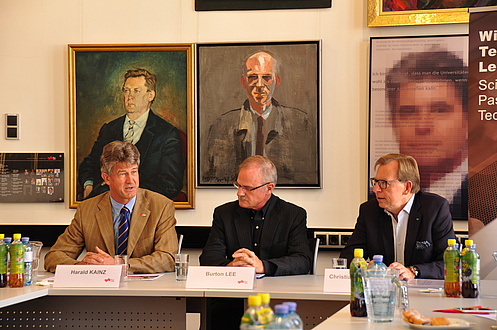In the international contest of locations and regions, software and data management as a future field of strength and a chief innovation potential of Styria is in urgent need of development and is at least as crucial for the future of the business location as is the expertise of the region in smart production and services. This assessment was made by Burton Lee, an expert on European Entrepreneurship and Innovation at Stanford University. Last June, on behalf of TU Graz and other partners from business, industry and politics, Lee turned his attention to the Styrian innovation and founder community and analysed potentials and challenges for the region.
From mechanical engineering culture to digital culture
Software, gaming and data management are among the strongest growing business fields in Styria with high start-up potential but they have been greatly under-appreciated regarding their strategic importance in the location’s future growth prosperity. Burton Lee: “There are great opportunities for the region in software and data management both for enterprises and consumers, cue gaming, as there are for applications in teaching and education, cue EduTech, and in eGovernment. Styria has enormous potential to become one of the leading European regions in this field.”Lee refers to the present strengths of Styrian HEIs, research organisations, clusters and companies and recommends a massive further development of the software and data sector at the level of regional economic policy, education and training and executive education and management. “This will create new jobs and satisfy industry’s demand for bright minds in software and data management.” There needs to be a digital transformation far beyond Industry 4.0 according to Lee – a change in enterprise work culture and extra attention given to the global growth potential of products, services, solutions and applications in consumer software.
Styria has enormous potential to become one of the leading European regions in this field.
Lessons from Silicon Valley – lessons for Styria
To further develop mechanical engineering culture into an integrated digital culture, the expert for European entrepreneurship has come up with concrete proposals. Some of Burton Lee’s selected recommendations for action are:- Software and data talent initiative
Shared training initiatives between Styrian universities and universities of applied science. By multiplying the range of courses, the number of students in software development, app development and gaming will be increased in a short period of time. Styria is developing an education and training road map for software, and is launching an initiative to enhance the profile of the career image of software and data specialists. An associated training offensive at Styrian schools at all ages is also desirable.
- Code camps (hackathons)
Establishment of regular code camp competitions in Styria with regional and international involvement from all disciplines dedicated to real, digital challenges to Styrian companies, clusters, research institutes and local government organisations.
- Emerging software + data cluster
Software and data management is to be established in Styria as an independent area separate from initiatives such as the microelectronics cluster or the IT cluster and recognised as an interdisciplinary area which supports all existing industry clusters and educational initiatives.
- Styria Software Council (or working group)
Establishment of a group to develop a vision and promotion of regional potentials in software development, gaming and data management composed of representatives of start-ups and established enterprises. Council members should include software entrepreneurs, CEOs and CIOs from industry, designers, researchers and students and representatives from clusters.
Software region Styria
Information and communication technologies are increasingly becoming a decisive factor in economic development and are therefore also an essential focal point in the new economic strategy Styria 2025. “In micro-electronics, as also in software engineering and data management, we have innovative companies and internationally renowned research organisations. We thus have good prerequisites to use the opportunities deriving from the digitalisation dynamics of the global economy to develop new products and services to create growth and new jobs. And I would like to especially support our companies in the next few years in this way. I’m convinced that we have room for improvement especially in the field of software, and the proposals of Burton Lee are an important foundation,” says provincial minister for economic affairs Christian Buchmann.I’m convinced that we have room for improvement especially in the field of software, and the proposals of Burton Lee are an important foundation.
Software Campus TU Graz
TU Graz will play a central role in Styria’s journey to becoming an international software hotspot. Rector Harald Kainz: “TU Graz already counts as one of the leading European research and educational institutes in computer science and software engineering. We will continue to develop in this direction together with our partners in business and industry to meet the increasing need on the job market.” TU Graz is already implementing a variety of initiatives in software development and data management in research, teaching and in the business training of its students. Based on the present study, TU Graz will expand its cross-faculty range of courses in software engineering, game development and mobile app coding and will support the proposed software and data talent initiative. Initiatives for entrepreneurship and design thinking which assist students in founding software start-ups and promote entrepreneurial initiatives are also in the planning stage. TU Graz has already strengthened a number of student initiatives and teams and will in future increasingly carry out activities such as hackathons, app-challenges and codeathons.TU Graz already counts as one of the leading European research and educational institutes in computer science and software engineering. We will continue to develop in this direction together with our partners in business and industry.
The main strategic element of TU Graz on the path to becoming Austria’s leading software smith is internationalisation in the field of computer science education. All computer science master’s programmes will be offered exclusively in English in the 2016/17 winter semester. This enables TU Graz to attract excellent international students and teaching staff and to promote an exchange with worldwide leading technical universities such as MIT and ETH Zürich. Master’s programmes held in English allow TU Graz to entice highly qualified students from southeast Europe to come to Graz and thus overall to increase the numbers of graduates.![[Translate to Englisch:] © TU Graz](https://www.tugraz.at/fileadmin/_processed_/1/5/csm_Banner_Studie_Burton_Lee_2016_Kainz_Lee_Buchmann_by_tugraz_d04e065d2a.jpg)


